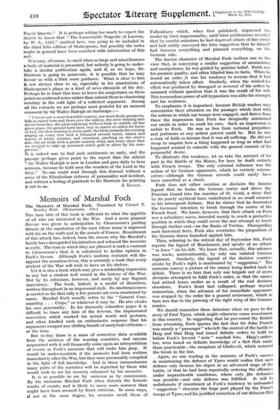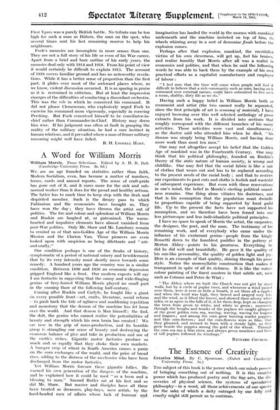Memoirs of Marshal Foch
The Memoirs of Marshal Foch. Translated by Colonel T.' Bentley Mott. (Heinemann. 25s.)
THE bare title of this book is sufficient to whet the appetite of all who are interested in the War. And a more piquant flavour was given to anticipation by Clemenceau's parting thrusts at the reputation of the man whose name is engraved with his on the walls and in the annals of France. Resentment of this attack has, indeed, been the reason why the Marshal's family have disregarded his intention and released the memoirs so early. The tone in which they are phrased is such a contrast to Clemenceau's that it is calculated to incline opinion in Foch's favour. Although Foch's uniform restraint will dis- appoint the sensation-lover, this is certainly a book that every student of the War will wish to have on his shelves.
Yet it is also a book which may give a misleading impression to any but a student well versed in the history of the War: Not by its criticisms, however, and rarely by any flagrant inaccuracy. The book, -indeed, is a model of discretion, written throughout in an impersonal style. Its unobtrusiveness is carried so far that only a few persons are even mentioned by name. Marshal Foch usually refers to the " General Com- manding . . . Corps," or whatever it may be. He also cloaks his own personality. In his discreetly colourless pages it is difficult to trace any hint of the fervour, the impassioned conviction which marked his actual words and gestures, and often kindled such• an enthusiastic response that his arguments escaped any chilling breath of analytical criticism— at the time.
But to-day there is a mass of corrective data available from the archives of the warring countries, and anyone acquainted with it will frequently come upon an interpretation of events in Foch's memoirs that will make him gasp. It would be understandable if the memoirs had been written immediately after the War, but they were presumably compiled in the light of full knowledge. And in these circumstances many parts of the narrative will be regretted by those who would wish to see his memory enhanced by his memoirs.
It is as possible to err by omission as by commission. By his omissions Marshal Foch often distorts the historic truths of events, and is likely to cause more soreness than might have been aroused by frank criticism. In some ways, if not in the same demve. his memoirs recall those of
Falkenhayn which, when first published, impressed the reader by their impersonality, until later publications revealed that by careful omissions he had deprived others of due credit and had subtly conveyed the false suggestion that he himself had foreseen everything and planned everything, on the German side.
The known character of Marshal Foch inclines one to the view that, in conveying a similar suggestion of omniscience and omnipotence, he was guided by genuine belief. Faith was
his greatest quality, and often blinded him to facts. When he issued an order pit was his tendency to assume that it had
automatically taken effect. Similarly, when the wished-for effect was produced by disregard Or reversal of his orders he assumed without question that it was the result of his will. This tremendous power of self-hypnotism was alike his strength and his weakness.
To emphasize it is important, because British readers may concentrate their attention on the passages which deal with the actions in which our troops were engaged, and derive from these the impression that Foch has designedly minimized our credit in order to exalt his own. Such an impression is unfair to Foch. He was as free from national prejudices and jealousies as any ardent patriot could be. But he was a man of faith so intense that it was all sufficing. He did not stoop to enquire how a thing happened so long as what had happened seemed to coincide with the general current of his purposeful desire.
To illustrate this tendency, let us take the account of his part in the Battle of the Marne, for here he dealt entirely with French troops. The only external influence was the action of his German opponents, which he entirely miscon- ceives—although the German records could easily have been consulted as a check.
Foch does not either mention or disclaim the famous legend that he broke the German centre and drove the Prussian Guard into the marshes of St. Gond, a story that by its purely mythical fame contributed in no small measure to his subsequent fortune. But he claims that he frustrated the Germans' intention to break through the centre of the French front. We know, however, that their attack on Foch was a subsidiary move, intended merely to reach a protective position in which they could cover the real attempt to break through further east—on the flanks of Verdun. Disregarding such historical facts, Foch also overstates the proportion of the German forces launched against him.
Then, referring to the critical day of September 9th, Foch repeats the legend of Mondement, and speaks of an attack " in force " on his left. We know that, actually, this advance was made, unintentionally, by only one isolated German regiment. Similarly, the legend of the decisive counter. stroke by Foch's right is maintained by " suggestion." The memoirs convey a picture of the enemy being hurled back in defeat. There is no hint that only one brigade out of seven divisions attempted to fulfil Foch's order, or that the enemy had retired hours earlier as a result of the real decision elsewhere. Foch's front had collapsed, perhaps beyond restoration, when the advance of his immediate opponents was stopped by the order for a general retirement, which in turn was due to the piercing of the right wing of the German armies.
We should remember these delusions when we pass to the story of First Ypres, which might otherwise cause resentment in this country. In suggesting that he prevented the British 1 from retreating, Foch ignores the fact that Sir John. French was merely a "passenger" who left the control of the battle to Haig and that Haig had issued definite orders to hold on before Foch's fervent " note " reached him. Haig's orders, ' too, were based on definite knowledge of a fact that made them practicable—the recapture of Gheluvelt, which restored the break in the line.
Again, no one reading in the memoirs of Foch's success in maintaining the defence of Ypres would realize that such defence only became his object at an advanced stage of the battle, or that he had been repeatedly ordering the offensive under impracticable conditions, where only the defensive was possible—and only defence was fulfilled. It will be unfortunate if resentment at Foch's tendency to unfounded " suggestion " obscures the large part played by the French troops at Ypres, and his justified correction of our delusion that
First Ypres was a purely British battle. No tribute can be too high for such a man as Dilbois, the man on the spot, who several times sent his last remaining reserve to help his neighbours.
Foch's memoirs are incomplete in more senses than one. They are not a full story of his life or even of his War career. Apart from a brief and bare outline of his early years, the memoirs deal only with 1914 and 1918. From his point of view it would certainly be difficult to explain 1915. The account of 1918 covers familiar ground and has no noteworthy revela- tions. While it has a better sense of proportion than the first part, it glides over most of the awkward places where, as we know, violent discussion occurred. It is as sparing in praise as it is restrained in criticism. But at least the impression emerges of the difficulties of conducting a discordant orchestra. This was the role in which he conceived his command. It did not please Clemenceau, who explOsively urged Foch to exercise his command more vigorously, especially in coercing Pershing. But Foch conceived himself to be conciliator-in- chief rather than Commander-in-Chief. History may deem him wise. If his judgment was often at fault in grasping the reality of the military situation, he had a sure instinct in human relations, and it prevailed where a man of firmer military reasoning might well have failed. B. H. LIDDELL HART.
























































 Previous page
Previous page